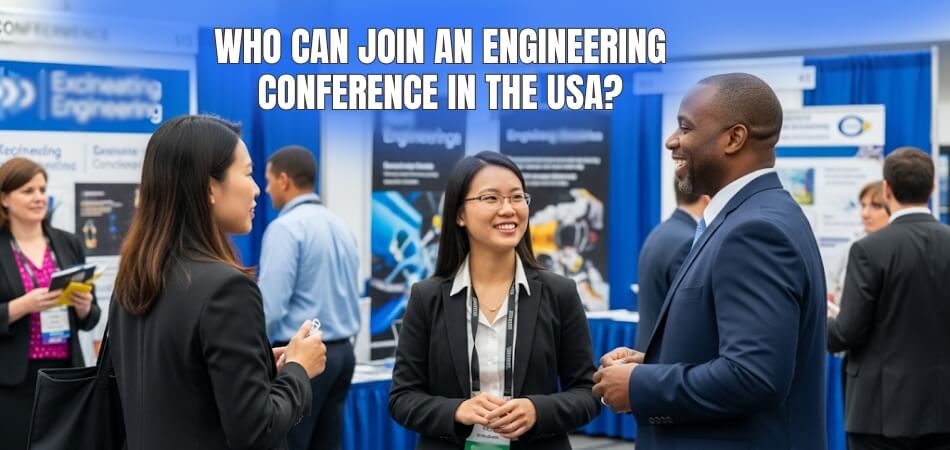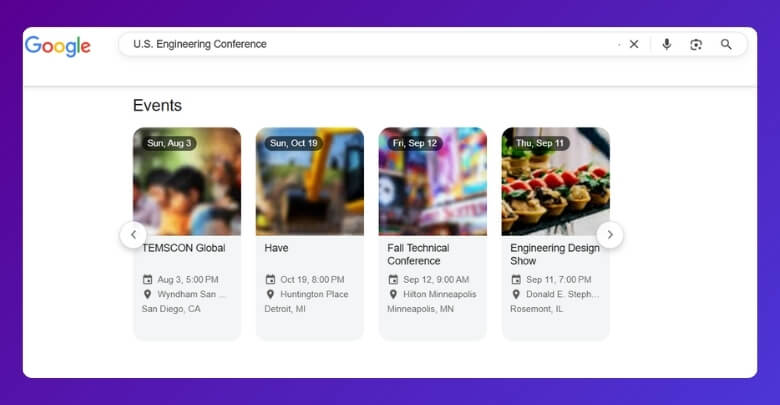These days, engineering conferences in the USA are full of excitement, ideas, and new inventions. They bring together all kinds of people who are interested in how things are built and improved. If you’ve ever had the thought, who can join an engineering conference in the USA?— You’re not alone.
Anyone interested in engineering can join an engineering conference in the USA. Common attendees are engineering professionals, college graduates, company representatives, researchers, teachers, people changing careers, and even those who are simply curious about engineering. Some conferences are open to the public, while others require registration. This allows people of various backgrounds to participate and learn.
Are you curious about what happens at these conferences or who you might see there? If yes, then keep reading, because this article shares everything you need to know about who can join and why they go.
Who Can Join an Engineering Conference in the USA?
If you’ve ever wondered who gets to be part of an engineering conference in the USA, you’re not alone. There are all kinds of people at these events. Let’s take a closer look at who you might find there and what they do.

Engineering Professionals
People who already work in the engineering field are the most common attendees. They come to learn about the latest technology, tools, and techniques. Many conferences in USA help these professionals stay up to date with what’s happening in their industry. It’s also a good place for them to meet others who work in the same area. Some of them also give talks or show their work at these events.
College Graduates
Those who have just finished college in engineering or a related subject can also attend. It gives them a chance to learn even more after finishing their studies. Many of them use these conferences to find job leads or talk to companies. It’s also a good way for them to ask questions and get real answers from experts. They often find it fun and useful for their future plans.
Company Representatives
People from companies that build or sell engineering tools often come too. They set up booths or tables to show off their products. These companies sometimes sponsor the event or give small gifts to visitors. It helps them connect with possible buyers or workers. It’s a good chance for them to talk about what they do.
Researchers and Scientists
Some people who study engineering problems or do science experiments are part of these events. They might share their research or listen to others. They get to talk about new discoveries or things they are working on. These talks are helpful for anyone who likes to know how things work. Their ideas can even lead to better machines or systems in the future.
Teachers and Educators
Teachers and professors who teach engineering topics also come to these conferences. They join to find better ways to teach or to stay current with what’s new. Some may lead a workshop or help others understand tough topics. They can bring back cool things to share with their own classes. It’s a place where even teachers get to learn.
People Changing Careers
Sometimes, people who work in a different field want to switch to engineering. These conferences are a great start for them. They can learn what skills are needed and meet people already in the field. It gives them ideas on what to study next. They also get to see if engineering is something they really want to do.
Curious Minds
You don’t always need a big job title to go. If someone is just very interested in engineering, they might be able to attend too. Some events allow anyone to register and join the sessions. It’s a fun way to explore and ask questions. If you’re interested and want to learn more, it’s worth checking out.
Are There Any Requirements for Attending an Engineering Conference in the USA?
Yes, there are some simple requirements for attending an engineering conference in the USA, but they’re not too hard to meet. These events are open to many people from different backgrounds and fields. Some rules might change depending on the event or where it is held. But don’t worry—it’s not as complicated as it may sound. Below is a list of requirements for attending a conference in the United States:
Registration Needed
Most engineering conferences require you to register before attending. This means you need to sign up online or through a form. Some events ask for a fee, while others might be free. After registration, you usually get a badge or a ticket to enter. Without registering, you may not be allowed inside.
ID or Badge
You will need some form of ID or a badge at the event. This helps the organizers know who is attending. Usually, you get a badge when you check in at the conference. It shows your name and sometimes your job or interests. This also helps others know who you are when they meet you.
Conference Fee
Many conferences ask for a fee to join. The amount depends on the type of event and who is organizing it. Some offer discounts for early registration or special groups. The money is usually used to pay for the venue, guest speakers, and food. Always check the event website for the fee details.
Age Limit
Most conferences are for adults, but some may allow younger people if they are really interested. Usually, there’s no strict age rule, but it’s best to check in advance. Some events might have rules if you are under 18. In that case, you may need an adult with you. Always read the rules before signing up.
Invitation Only
Some engineering conferences are open to everyone, but a few are by invitation only. This means you need to be invited by someone who is already part of the event. These are usually smaller or more private meetings. If it’s invite-only, you can’t just register on your own. Always check if the event is public or private.
Travel Documents
If you’re coming from another country, you’ll need a valid passport and sometimes a visa. These papers let you travel and attend an engineering conference in the USA without any legal issues. Getting a visa can take time, so plan early. The conference might send you a letter to help with your visa process. Make sure everything is ready before you book your trip.
How Do You Know If an Engineering Conference in the USA Is Open to the Public?
Some engineering conferences welcome everyone, while others are only for invited guests or members. It’s important to check before making plans. Here’s how you can tell if the event is open to the public.
- Official Website Info: Conference websites usually list who can attend and how. Look for terms like “public event” or “open registration.”
- Registration Page Access: If anyone can register without special approval, it’s public. A simple form and payment option often means open access.
- Social Media Posts: Public events are often shared on social media to reach more people. Watch for announcements on platforms like X or LinkedIn.
- No Membership Needed: If you don’t need to be part of an organization to join, it’s likely a public event anyone can attend.
- Open Schedule Display: A full event schedule shown online usually means it’s open. Private events rarely share detailed plans with the public.
- No Special Invite: You don’t need a personal invite to join. If anyone can sign up, that’s a good sign it’s public.
- Media or Press Welcome: If media or journalists are invited, the event is probably public. Organizers want wider attention and open participation.
- Mention of Walk-ins: Some listings allow walk-in guests at the venue. This usually means the event welcomes general public attendance.
What to Look for When Choosing a U.S.-Based Engineering Conference?
There are many engineering conferences in the U.S., and each one offers something a little different. Picking the right one can help you learn more and enjoy the experience. It’s good to know what makes a conference worth your time. Keep reading to see what things you should check before choosing.
Type of Topics
Check what topics the conference will cover. Some focus on machines, while others talk about buildings, software, or space. Pick a conference that matches what you’re most interested in. This way, you’ll understand the sessions better and enjoy them more.
Speakers and Guests
Look at the list of people who will be speaking or attending. Are they well-known or working on cool projects? Good speakers can teach you new things and keep you interested. It’s fun to listen to people who know a lot about their field.
Event Schedule
A clear schedule is very helpful. It tells you what events are happening, and when. Make sure the topics you like are on days you can attend. A good schedule also gives you time to take breaks or explore.
Hands-On Sessions
Some conferences have hands-on workshops or live demos. These are great because you get to see how things work in real life. It’s more fun than just listening all day. Look for events where you can try something, not just sit and watch.
Location and Travel
Think about where the conference is being held. Is it easy to get there? Will you need to stay overnight? If the place is far, check if it’s worth the travel and cost. Pick a location that fits your plan and budget.
Cost and Fees
Some conferences are free, while others charge a fee. The fee or cost to attend an engineering conference in the USA often depends on what the event offers and includes. Look at what’s included in the price—like food, materials, or entry to sessions. If it’s too expensive, check if there are discounts or early sign-up deals. Always make sure the price is fair for what you’ll get.
Public or Private
Make sure the event is open to the public. Some conferences are invite-only, and others need special permission to attend. If you can sign up online without a problem, it’s probably public. Always double-check before making plans.
Tips for Attending Your First Engineering Conference in the U.S.
Going to your first engineering conference can be both exciting and a little overwhelming. With the right tips, you’ll feel more prepared. These simple pointers will help you make the most of your time there.
- Plan Ahead Early: Look at the schedule before the event starts. Choose sessions that interest you most and note the important times and locations.
- Complete Registration First: Make sure you register early to save your spot. Some events fill up fast or charge more closer to the date.
- Apply for a Visa Early: If you’re traveling from another country, apply for your visa early. You may also need a conference invitation for the process.
- Dress Comfortably Smart: Wear something neat but comfortable. You’ll walk and sit a lot, so avoid shoes or clothes that make you feel tired.
- Bring a Notebook: Carry a notebook or use your phone to take notes. You’ll hear many new ideas that you might want to remember.
- Talk to People: Say hello and start small conversations. You never know who you’ll meet or what useful things they might share.
- Visit Booth Areas: Check out the booths and displays during breaks. You might find cool gadgets, free stuff, or even job opportunities.
- Check Travel Time: Know how long it takes to get to the event. Arriving early helps you stay relaxed and ready to enjoy everything.
How to Follow Up After an Engineering Conference in the USA?
Once the conference is over, it doesn’t mean everything ends there. What you do afterward is just as important as attending. There are simple ways to stay connected and use what you learned. Keep reading to find out how to follow up the right way.
Thank You Messages
Send short thank-you messages to people you met or listened to. A quick email or note shows you appreciate their time. You don’t need to write much—just be polite and clear. It helps them remember you later. Being kind goes a long way. The following is a sample email thank you message:
Subject: Thank You for the Great Session
Hi [Name],
I just wanted to say thank you for your talk at the conference. I really enjoyed learning about [mention the topic briefly], and it helped me understand the subject better.
It was great to hear your thoughts, and I hope to attend more of your sessions in the future.
Best regards,
[Your Name]
Organize Your Notes
Go through the notes you wrote during the event. Sort them by topic or speaker to make things easier to find later. This helps you remember useful ideas or tools you heard about. If something was unclear, look it up now. It’s better to review while it’s still fresh.
Stay in Touch
If someone shared their contact info, try to keep in touch. You can follow them on social media or send a message later. Don’t message too much—just once in a while is fine. If you liked their work, let them know. Small messages help build real connections.
Share What You Learned
Tell others about the interesting things you learned. You can talk about it with friends or post something simple online. This helps you remember the main points better. It might also help someone else who didn’t attend. Sharing keeps the learning going.
Check Out New Tools
Some speakers may have mentioned apps, websites, or tools. Take time to explore these on your own. Try out what looks interesting or useful. You might find something that helps you later on. Keep a list of your favorites for future use.
Plan for the Next
Think about what you liked and what could be better next time. Use this to plan for your next conference. Maybe you want to attend more sessions or talk to more people. Make a small list of things to try. Each event can be better than the last.
Commonly Asked Questions
After learning about who can join an engineering conference in the USA, you might still have a few more things on your mind. This FAQ section answers some extra questions people often wonder about when thinking of attending a conference like this.
What Should I Bring With Me to the Engineering Conference?
Bring a notebook, a pen, your ID, and your registration details. If you have business cards, those are useful too. Some people also carry a small bag with water, snacks, or a phone charger. Being prepared helps you stay focused and comfortable all day.
How Do I Choose the Right Conference for My Interests?
Start by checking the topics covered in each event. Look at the speakers, workshop sessions, and the type of people attending. If the topics match what you enjoy or want to learn about, it’s a good fit. You can also read reviews from past attendees.
Which Type of Conferences Are Best for Beginners?
Smaller or general-topic conferences are usually best for beginners. They often have easy-to-follow sessions and friendly networking spaces. Look for events that are open to the public and have beginner workshops. These are great places to learn and feel comfortable.
What Happens After You Sign Up for an Engineering Conference?
After you register, you’ll usually get a confirmation email with event details. This includes location, schedule, and sometimes a digital badge. Some engineering conferences also share tips for first-time attendees. Keep this info saved—you’ll need it on the day of the event.
How Are Engineering Conferences Different From Other Events?
Engineering conferences focus on how things work, how to improve them, and how people solve real-world problems. They bring together creative thinkers, problem-solvers, and builders. Unlike casual events, these are more focused on learning, sharing ideas, and sometimes hands-on activities.
What If I’m Not Sure Which Area of Engineering I Like?
That’s totally fine—many people attend to explore different branches. Conferences often cover multiple areas like mechanical, civil, software, or electrical engineering. Attending can help you discover what you like best by listening to talks or joining group activities.
Bottom Line
Engineering conferences in the USA are not just about science and machines—they’re also about people, ideas, and the excitement of learning something new. Whether you’re already working in the field or just curious about how things work, these events can open new doors and spark new interests.
The great thing is that you don’t always need a degree, a job title, or years of experience to attend. What matters most is your interest and willingness to learn. From talks and workshops to hands-on demos and friendly chats, there’s something for everyone to enjoy.
So, if you’ve been wondering who can join an engineering conference in the USA, the answer is simple: people just like you. If you love to explore, learn, and be part of something big, it might be time to step in and take a look.







